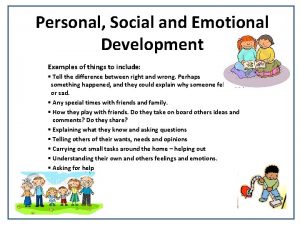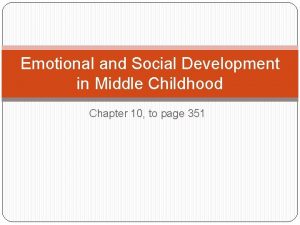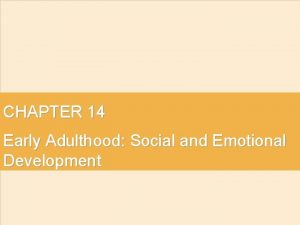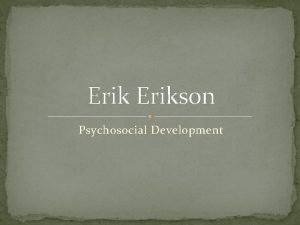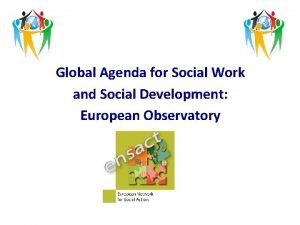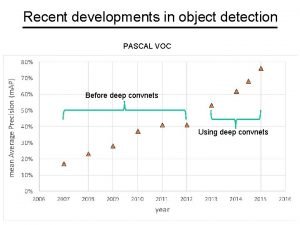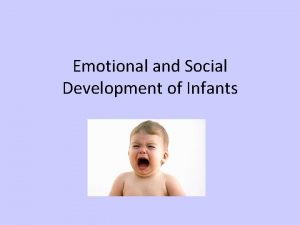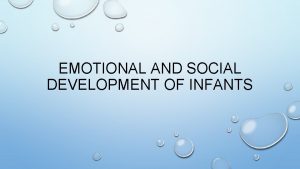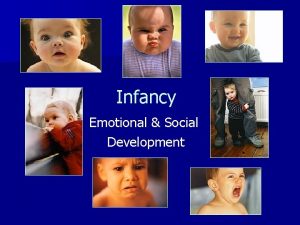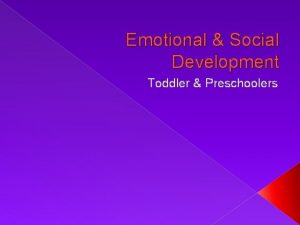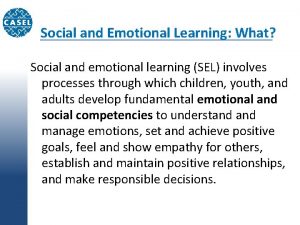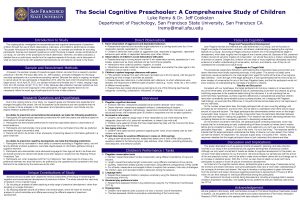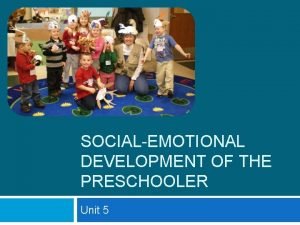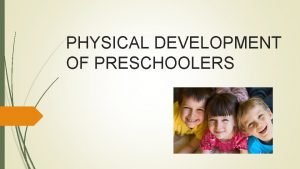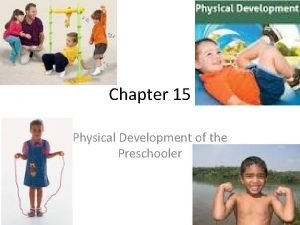Emotional Development of Preschooler Emotional and Social developments










- Slides: 10

Emotional Development of Preschooler

Emotional and Social developments are dependent on each other �Children as all other people communicate emotions without speaking, need to be aware of messages you send and they send back �Body language- smile, frown, arms crossed, wink

Two Types of Behavior �Affective- unobservable behavior �Effective- observable behavior • Effect on actions

Developing Emotions in Child (Types of Effective Behavior) � Love- nurturing is main component in love • Relationships/ love go together in many cases �Nurturing – willingness to promote well being and development of loved one �Love needs to be given and accepted �Children act a certain way to gain acceptance �Young child dependent on parents and siblings for love, or on friends, adults Child’s attitude about grandparents can give examples of degrees. Child’s attitude to grandparents is affected by grandparents attitude towards child. Playmates- develop feelings through experiences and senses Attitude about self comes from how other people treat child

Sexual Curiosity �Natural curiosity about their bodies and others �Depends on way child care provider addresses this curiosity, child may feel fine, may feel dirty �Sexist attitudes can be passed on at this time

Fear �Fear of noises, strange objects, situations, persons decrease with age �Fear of imagined things increases during preschool �Fears can be learned and passed onto a child

Anxiety- worry or deep concern about impending danger or misfortune �Lose parents love when new baby comes �Bad to good child comparisons �No lasting relationships outside home �Bitterness between divorced parents �Marriage to a new parents �Alcoholism

�Jealousy – the angry feeling that results when individuals are frustrated with desire to be loved best �Rivalry – angry behavior resulting from frustrated desires to be loved most • May attack • May ignore presence or existence • Personality change

Minimize these reactions to rivalry and jealousy �Accept child as individual �Avoid comparisons to motivate siblings �Understand accept jealousy �Accept faults �Appreciate talents �Spend time alone with each child

Anger and Aggression � Anger – feelings that accompanies being removed or blocked on progress toward some sort of fulfillment � Aggression – actual behavior or attack which accompanies anger • Lashing out • Kicking, biting, or throwing things (late infancy) • Temper tantrums (ignoring is the best way after stating you won’t deal with them until they stop that behavior and follow through with the statement)
 Fictional character names
Fictional character names Social and emotional development in middle childhood
Social and emotional development in middle childhood Social and emotional development in middle adulthood
Social and emotional development in middle adulthood Social development early adulthood
Social development early adulthood Emotional development in late adulthood
Emotional development in late adulthood Autonomy vs shame and doubt example
Autonomy vs shame and doubt example Global agenda for social work and social development
Global agenda for social work and social development Recent developments in ict
Recent developments in ict Recent developments in object detection
Recent developments in object detection Cultural development of sahelanthropus tchadensis brainly
Cultural development of sahelanthropus tchadensis brainly Chartered developments
Chartered developments
